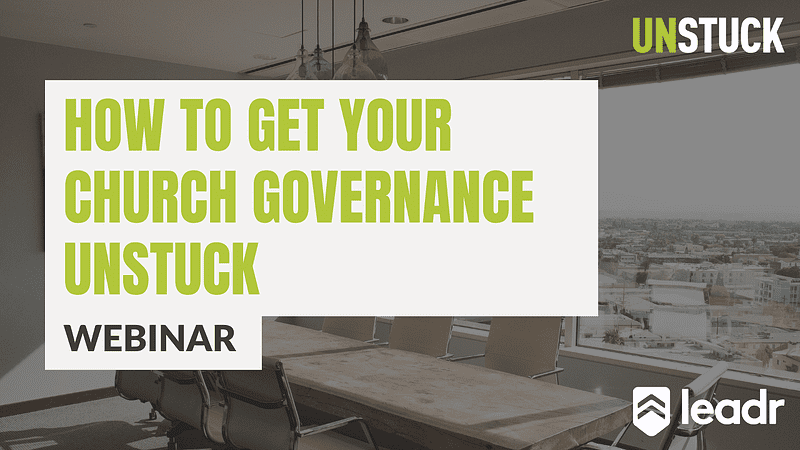[vc_row][vc_column][vc_column_text]
“Life is not fair… and then you die.”
When planning your yearly budget, it can be easy to want to give all of your ministry areas the same amount of funding. However, like I mentioned in this week’s episode, “life isn’t fair.”
When planning your budget, it’s important to strategically plan where you’re going to allocate funds and how much you want to spend. In the 50th episode of The Unstuck Church Podcast, Amy Anderson and I explain the Biblical principles behind budgeting and how to utilize those in your church.
In this episode, we discuss:
-
Why your ministry plan should determine your budget (and not the other way around)
-
Why budgeting strictly by faith may be equivalent to “budgeting by stupidity”
-
How to prioritize which ministries receive what funding
-
Why it’s okay to not give everyone a voice over your budget
Join the Conversation:
Do you still have questions on how to allocate what money where? Ask in the comments or on social media using #unstuckchurch. I’m excited to read your thoughts and questions.
If you enjoyed this episode of The Unstuck Church Podcast, subscribe for more here:
+ RESOURCES
- The Unstuck Group Leadership Coaching Networks
- The Unstuck Church Assessment
- Differences Between Growing and Declining Churches: Ministry Finances
- The Unstuck Church Report
[/vc_column_text][vc_text_separator title=”Podcast Transcript” color=”black”][vc_column_text]Speaker 1: 00:14 Welcome to The Unstuck Church Podcast. I’m Amy Anderson, and I’m here with Tony Morgan, and each week on this podcast we share a conversation our team’s been having about getting churches unstuck. So let’s get to our conversation today. We had a good discussion last week, and today we’re talking about how we invest in the various ministries of the church. Because you and I talk about this all the time, Tony that not all of the ministries are created equal. So where do you want to start with this one?
Tony Morgan: 00:39 All right, so first we should follow the Biblical principle of planning before we build. And so in other words, what I want to talk about here for a moment is this: before we build our budget plan or our financial plan for the next year, we should create a ministry plan. In other words, our ministry plan should drive how we spend our money rather than the budget plan driving the ministry plan. And that commonly is where I see churches getting challenged or getting stuck in this area is they look at financially how much money we have. How are we going to spend the money? And then they build their ministry plan based on that. And of course, Amy, you know the, the coaching that we provide through The Unstuck Group is… let’s, let’s step back first and look at what are our ministry objectives, what are we, what are we trying to accomplish in the next 12 months?
Tony Morgan: 01:34 Where does our priority need to be regarding our ministry plan? And then let’s build the financial plan to support that. So making sure that we’re kind of priority prioritizing first thing first. Secondly, I think we need to follow this principle when it comes to spending money. We actually have to spend less… plan on spending less than we anticipate bringing in as a church through our tithes and offerings. And goodness, you would be surprised at how many churches that I run into that take this approach to budgeting. What they do is they look at how much they’ve brought in in tithes and offerings in the past. They plan to spend that amount plus an additional percentage plus five percent, 10 percent, 20 percent, and they call this budgeting by faith. I tend to call it budgeting by stupidity, but that’s maybe a topic for a different podcast, Amy, because every time I see a church do this, I’ve never, never seen it work.
Tony Morgan: 02:43 And what ends up happening is they set a budget that exceeds what they anticipate receiving, and they’re praying and hoping that God’s going to provide this extra percentage, but the extra percentage never comes in. And so usually it’s about June or maybe July, they realize, oh, we aren’t going to have enough offerings come in this year that to cover all of the expenses that we’ve planned for. And so it’s about June or July that we get the message email message from the finance director. Everybody, we have a budget freeze in place. Uh, so we’re freezing spending and in fact we might have to cut some spending because the offerings aren’t going to match what we’ve budgeted for. Now, what, what happens of course, is the smart ministry leaders recognize this is going to happen every year. And so the smart ministry leaders start spending lots of money in January and February.
Tony Morgan: 03:44 Yeah, yeah. Yeah. So we’ve kind of conditioned the smart ministry leaders to make sure they spend a lot of money early in the year when we’re budgeting by faith because they know come June and July, we’re going to start budgeting by reality. And so rather than approaching the budgeting process that way, I’m encouraging churches to look at what actually came in and rather than planning to spend all that money to actually only spend 95 percent of it or 90 percent of it, uh, in other words, to make a tough decision one time where we’re going to reduce expenditures. And if that has to, has to do with just reducing ministry budgets or if we might have to initially cut back on staff, let’s do that. But let’s reduce our budget so that it’s less than what we expect to come in. And then here’s the fun thing with that is many times then what churches experiences, they get that amount coming in and their ties and offerings, but they end up seeing more come in than they have budgeted for. And so then in June and July, we have this fantastic problem. We have to decide what are we going to do with the extra money that we have, and I’m just telling you, I’ve been in both situations. It’s a lot more fun to have that second problem where we have to decide what are we going, where are we going to invest the extra money? Now, let me just try to to push this home just a little bit further. Amy, if you came to me and you were looking for some personal coaching for your personal finances, I would never coach you to plan on spending your entire salary plus 10 percent more and hope God would provide that extra 10 percent. I’ve, I’ve never heard Dave Ramsey provide that coaching to anybody. Instead, no. Instead what he coaches is identify how much are you going to bring in and plan on spending less than that and actually plan on giving to God first and setting aside some money in savings and then live on the rest of the money that comes in, and honestly, I think that is actually a good philosophy for churches as well.
Tony Morgan: 06:06 We should not plan on spending more than we expect to come in to our tithes and offerings.
Amy Anderson: 06:13 You know, we’ve talked about this a couple times in the last week and as you were describing it this time, and maybe it’s redundant, but I like how you say start by dreaming about what you want to do be instead of just starting with the limitations of a budget, because as you work these principles, what I hear is some of the dreaming that you’re doing at the beginning, you’ll have to cut back on as you do hit the reality of what the budget is, but you’ve done that dreamy. And if God provides more, you’ve got those great ideas to sort of right back into. Right?
Tony Morgan: 06:13 That’s exactly right.
Amy Anderson: 06:46 Um, so then when you actually allocate ministry dollars to the various ministries, Tony, um, what do you see successful churches doing when they’re, you know, like what strategy are they taking to allocate those dollars?
Tony Morgan: 07:00 Yeah. So, uh, the first thing here, we’ve talked a lot in the past. Amy, you and I have talked about growth engines in our churches have things that are helping us grow numerically, reach more people, but also helping people grow spiritually, helping people take their next steps toward Christ. And so when you’re allocating ministry dollars, you have to prioritize funding your growth engines that, that’s where the focus of your ministry resources, financial resources and needs to go. Secondly, we need to make sure we’re prioritizing the key initiatives that we’re expecting to accomplish in the next six to 12 months. And I love this quote from Patrick Lencioni. Um, he, he had said if everything’s important, nothing is. And, and more, more specifically, this is the quote most of the companies I’ve encountered or over the years seem to be addicted to having a long list of top priorities in quotes.
Tony Morgan: 07:59 And as a result, they’re unable to focus on any one of them. And so the vast majority of these organizations end up peanut buttering their energy and their attention across so many different initiatives, activities that none of them seem to be more important or more imperative than another. I love that phrase. We ended up peanut buttering our energy and attention, in this case, our financial resources, and so his coaching and our coaching is let’s identify what the priority initiatives are, what are those top initiatives that we have to get accomplished, and let’s make sure those priority initiatives are fully funded. And so, uh, the bottom line on this is we can’t be fair. We can’t, we can’t assume every ministry of the church and every initiative and the church is going to get the same of money. We can’t try to be fair. My Grandmother, she just, she couldn’t understand that she had all these grandkids, and she just wanted to make sure everybody got the same gift, exact same gift because she, she wanted to be completely fair with everybody. And I see churches doing the same thing. They’re trying to be completely fair with every ministry of the church. Mark Beesin, my friend and pastor at granger community church for a number of years used to say this: “Life is not fair, and then you die.”
Tony Morgan: 09:31 Which I think is just a great phrase because life is not fair. And then we all die and in ministry life isn’t fair to and instead we should be focused on focusing on our resources where they’re going to have the greatest impact we want. We want people to experience life change. We want people to experience relationship with Christ and take their next steps toward Christ. And so we should be leveraging the limited resources we have in the places that they’re going to have. The biggest impact in. A good example of life not being fair is when, when I was at Granger, I knew these numbers because I was part of the team that it was actually building the budget every year. We knew that our weekend experience, everything that was happening on the weekend was one of our primary growth engines in helping us reach more people and it was helping us help many people take their next steps toward Christ. And because of that we were investing 70 percent of our ministry budget at the time on our weekend experience. What was happening in the services? What was happening in guest services, what was happening in children’s ministry, advertising and marketing into the community. It was getting the biggest chunk of our ministry budget because that’s where we were having the greatest growth impact, so we need to prioritize what’s what, what are those top priorities and make sure those priorities are fully funded. It’s all sad.
Amy Anderson: 11:07 Tony, so you said you were part of the team that worked in the budgeting process, so as the budget person to do get to decide how to spend the money for granger or how did that. How did that come to be?
Tony Morgan: 11:16 Yeah, so the congregation should not be deciding how to spend the money, and we’ve talked about this a number of times. It’s just when you invite the entire congregation to make decisions like this, not only are you inviting spiritually mature people to decide where money gets spent and leaders to decide where money gets spent. You’re also inviting people that may not have a relationship with Christ yet to have a vote and you might be inviting new believers to have a vote, and I just don’t believe that’s God’s design for the Body of Christ, for, for people that may not be qualified as to be Biblical leaders of our ministry to be making decisions about how we invest limited resources in our church. I’m also along these lines: I don’t think the finance committee or the treasurer or the bookkeeper should be deciding where to spend my money either.
Tony Morgan: 12:13 Um, instead it should be ministry leaders deciding where we invest our resources; the finance committees and the treasurers and the bookkeepers, nce that decision has been made, will help us have good boundaries and good practices for handling money, but they don’t get to decide where money gets spent. And this is one of the frustrations that I run into working with churches is it’s not unusual for them to have a board and then a personnel committee and Finance Committee and then a trustees committee that’s handling the property of the church as an example. And the staff leadership. The pastoral team, the board of the church could be saying, we need to invest our money here, and then over in this corner of the Church building is a subcommittee of Finance people and the treasurer that are essentially calling the shots about where money gets bad and because of that they are actually driving the ministry strategy of the Church and again, I don’t think that’s God’s design for the church.
Tony Morgan: 13:17 We should have… we should be identifying people that are biblically qualified to lead our church, and they should ultimately be making not only decisions about ministry strategy, but also how we fund the ministries that are happening in our church as well. So I think in the healthiest churches, what we see is this. It’s a model where the senior pastor and the senior team is developing the strategy, and they are developing the budget plan and then bringing that plan to a board and it’s the board that’s essentially affirming what the senior leadership of the staff leadership is, is recommending should be the spending plan for the church
Amy Anderson: 14:01 So, just some wisdom and a second check for the team, right? That they’re planning according to what they say they want to do.
Tony Morgan: 14:07 That’s right. So the key here is don’t let the money people drive the ministry decisions. It should be the ministry leaders that are driving both ministry decisions, and then the financial decisions that will impact the ministry plan.
Amy Anderson: 14:24 Hey, and just one followup question. You know, we talked earlier about, you know, plan to spend less than what you think is coming in when more money does come in, who decides where that more money goes?
Tony Morgan: 14:37 Again, I think it should work the same way the senior pastor, and the senior team should be recommending to the board, and in almost every church, I know there is some board that is making the final decision on the overall budget, but they should be bringing that recommendation to the board to affirm that, and you know where there’s disagreement. Then we can talk through that and figure out what, what is the real priority. Hopefully both the pastor and his staff team, his or her staff team and the board. Altogether we have the same. We’re unified, we want… We have this mission and vision to be accomplished, but there will be times where we kind of disagree on how specifically does that happen and when that happens we get to talk through together.
Amy Anderson: 15:23 Yeah. If I remember right, I think our approach back in the day was that we’d have our budget and our plans, but we actually would have any. If God blesses us more, how we would spend that additional money. We decide that upfront as well. But we don’t live off that when we live off the first one. That’s right. All right, well thank you, Tony, and thanks to our listeners for joining us this week, and we hope that you’ll tune in again, be sure to subscribe on iTunes, Google play, or wherever you get your podcasts, so you don’t miss an episode. Thanks for being with us this week and we’ll talk to you next week.
[/vc_column_text][/vc_column][/vc_row]






